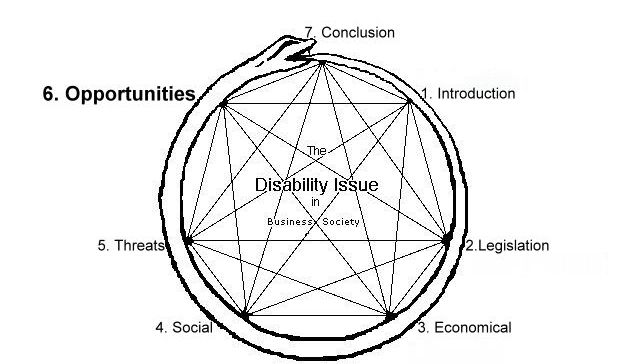
Content of Chapter 6
6.1 Introduction
6.1.1 Talent Search - Higher Understanding
6.1.2 What is Performance?
6.1.3 What is Motivation?
6.2 Some History of Motivation
6.2.1 Greek Philosophy
6.2.2 Freud
6.2.3 Maslow
6.2.4 Herzberg
6.2.5 Stress
6.2.5.1 Introduction
6.2.5.2 Eu-Stress and Di-Stress
6.2.5.3 Stress and Motivation
6.2.5.4 Stress Generator Work
6.2.5.5 Health Impact of Stress
6.2.5.6 Disability linked to Stress-Awareness
6.2.5.7 Stress Conclusion
6.2.6 Conclusion to Motivation
6.2.6.1 How to stimulate peoples' Teamwork?
6.2.6.2 Disabled people can encourage Teamwork
6.3 EQ & SQ
6.3.1 Introduction to EQ and SQ
6.3.1.1 A summarizing History of Intelligence Science
6.3.1.2 Two Modern Approaches of Intelligence
6.3.1.3 My Personal Approach
6.3.2 EQ
6.3.2.1 Introduction EQ
6.3.2.2 Disability and Emotional Competencies
6.3.3 SQ
6.3.3.1 Introduction SQ
6.3.3.2 Brain Work
6.3.3.3 The Search for Meaning / The Lack of Spirit
6.3.3.5 The Disability Spirit
6.3.3.5 Conclusion SQ
6.3.4 Conclusion SQ & EQ
|
|

6.1 Introduction
Why would you employ a disabled person? During the research mainly three answers were given:
- Low costs through state benefits
- Public Relations to show that we are a liberal employer
- To have someone who handles with enthusiasm primitive work, which a non-disabled person would not like to do.
None of the answers fitted to my personal approach. What can a disabled person contribute to make an organization work better? My approach is not based on superficial benefits. It is about the change that takes place in our well-fare society.
Benefits, why to consider employing disabled people in my idea are:
- Fostering talents; see new perspectives of own skills
- Calm; anti stress through actively become aware of limits
- Sustainability; as confidence and therefore loyalty becomes increasingly important
- Ethnical economical; for an increase in the organizational performance through self-awareness and development.
top -
next
|
|

6.1.1 Talent Search - Higher Understanding
Disabled people who already made a graduation must have energy and willpower. So they might tend to feel provoked by exaggeration. Additionally, evidence shows that they are the most loyal employees. (doctorjob's 2004 p.17) But they also have different skills. One example is the viewpoint of a person who is blind. As she can't see, she has to ask for things. Explaining to her, means also to re-think and express the objectives in different ways. Different perspectives can show different solutions. This is something what Jutta feels highly motivated about. (Rütter & Kokigei 1999 p.172 Translation 1)
top -
next
|
|

6.1.2 What is Performance?
"Productivity is the ratio between output and input. An increase in productivity means either obtaining a greater amount of output from the same amount of input, or the same output from less input." (Bowey & Thorpe, 1986) (22.)
To satisfy shareholders and investors employers have to motivate employee to reach performance.
top -
next
22. Footnote:
I use the terms performance and productivity with the same meaning. In our increasing service orientated industry, performance becomes less measurable compared to the products a few decades ago. Back to Context
|
|
|

6.1.3 What is Motivation?
General "motivation is to make somebody do something." (Ivanovic, A. & Collin P.H. 2003) Still money is mostly seen as "the most effective motivator." (Frey 1997 p.13) This differs form the psychologist' point of view, which is that all motivation comes from within a person. (Hollyforde & Whiddett, 2002)
Disabled people tend to have a high self-motivation as they try hard to proof themselves as equal in productivity compared to non-disabled. They want to justify their value and importance for the company.
top -
next
|
|

6.2 Some History of Motivation
6.2.1 Greek Philosophy
The earliest approach was that of hedonism. People behave in such a way as to maximise pleasure and minimize pain. (Kuper & Kuper 1999) Epicurus realized that 'the striving for pleasure is our first natural impulse, an impulse which we share with the animals.' (Rist 1972) Socrates realized that he knew nothing. His drive was, that this 'not knowing' troubled him. (Gaarder 1991)
top -
next
|
|

6.2.2 Freud
Freud developed the idea that humans must be to
"(…) some extent at the mercy of psychological forces which are outside their conscious control, and that they are usually unaware of the real reasons for their actions." (Kuper & Kuper 1999)
top -
next
|
|

6.2.3 Maslow
Maslow became popular for his hierarchy of motivational needs and provides a five-tier view. (Cooper & Makin 1984) Once one 'tier' becomes satisfied, the next 'need' comes up. (23.) Therefore, the whole individual has to be considered, rather than just his performance. Otherwise, the motivational input is doomed to be ineffective if it is directed at one level when a lower one is unsatisfied. (Forsyth 2000 p.18) Thus people want quite contrary things at different times and are in this respect 'inherently inconsistent.' (Kuper & Kuper 1999)
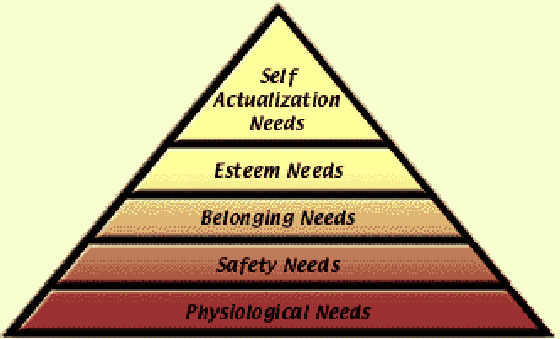
Figure 2: Maslow's 'Hierarchy of Needs'
(Source: www.lifeworktransitions.com/images/maslow.gif)
- "Physiological needs are basic biological needs essential for survival. They include food, drink, shelter, rest, sleep, sex, oxygen.
- Safety and security needs include protection from physical and psychological threats in the environment such as freedom from fears, and a wish for certainty.
- Social and belonging needs include a need for love, affection, friendship, social interaction and acceptance of others.
- Ego and esteem needs include a need for self-respect, confidence, recognition, respect from others, status, power and competence.
- Self-actualisation includes self-fulfilment, achievement, individual growth, and the realisation of potential." (Beardwell & Holden 1997)
Social needs and safety belong to Maslow's hierarchy. (Maslow 1954) Thus, it appears that the development of interpersonal skills is already important for Maslow.
Disability linked to Maslow's 'Hierarchy of Needs'
Disabled people tend to have different needs than non-disabled. Visible disabled are more likely to become discriminated and have to express many times, which behaviour is correct and which isn't. Communication about every day behaviour needs to improve or even implemented. Humans are more satisfied when they think they are a good person. (24.) When they feel well in their environment and see that, they have to accept others imperfectness, then they are more likely to accept that their own limits becomes visible. That would lead to a higher performance through self-awareness. (25.)
top -
next
|
|

6.2.4 Herzberg
Frederick Herzberg developed the 'Two-Factor Theory' in 1968, which is a key theory of motivation. Most managers are familiar with its recommendations. Herzberg distinguishes between 'Motivators' that can increase motivation and 'Hygiene Factors' (26.) that can only reduce job dissatisfaction, but not increase motivation.
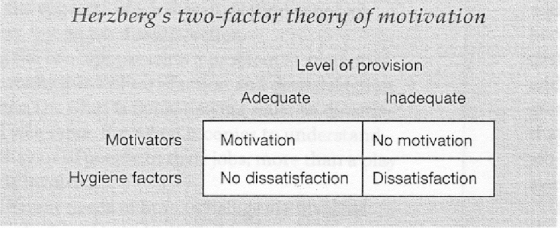
Figure 3: Herzberg's 'Two-Factor Theory of Motivation (Source: Beardwell & Holden 1997)
The best example for a 'Hygiene Factor' might be money, which can only decrease the motivation when its ratio is not justified. (Herzberg 1959) Performance related pay is therefore more a form of punishment than motivation. After Herzberg the surest way to make somebody doing what you want to is a KITA (Kick in the Pants). But while KITA might change the behaviour, it doesn't motivate. The employee with an internal generator needs no KITA.
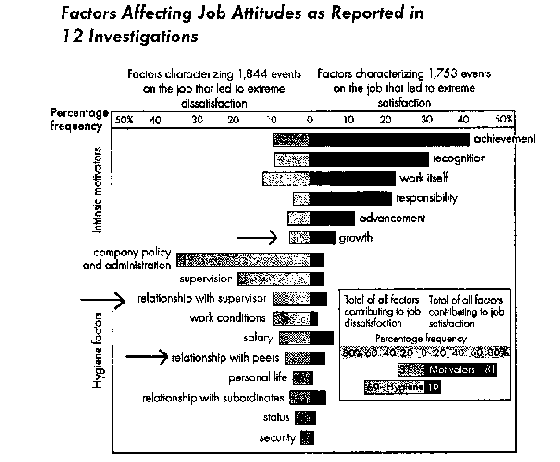
Graph 7: Factors affecting Job Attitudes (Source: Beardwell & Holden 1997)
Disability linked to Herzberg's 'Two-Factor Theory'
Two of this 'Hygiene Factors' are the relationship with peers and supervisors. The condition of internal relationships is important, but cannot contribute to a higher level of motivation. A motivator after Herzberg is the 'feeling of personal growth.' Those aspects will be discussed later in this chapter (EI & SQ).
top -
next
|
|

6.2.5 Stress
6.2.5.1 Introduction
Stress-syndromes and Stress-coping are big issues in our modern society. Some details are explained to state, how big the impact and trouble is, when we are working.
"Definition of stress: the condition that results when person-environment transactions lead to a perceived discrepancy between the demands of a situation and the resources of the person's biological, psychological, and social system." (Sarafino 2002 p. 95)
top -
next

6.2.5.2 Eu-Stress and Di-Stress
The main idea of motivation through stress is that a person changes in behaviour based on a dependency upon if "we may get rewarded or punished." (Cooper & Makin 1984 p.32) Stress can be divided in 'Eu-Stress' and has a positive effect on our working behaviour (27.) and 'Di-Stress' has an actual threat and rises from existential fears, such as death or war. 'Di-Stress' can affect behaviour, which, in turn, can lead to illness or worsen an existing condition. Moreover 'Di-stress' increases the possibility of accidents, errors during work and reduces people's helping behaviour. (brainconnection.com)
top -
next

6.2.5.3 Stress and Motivation
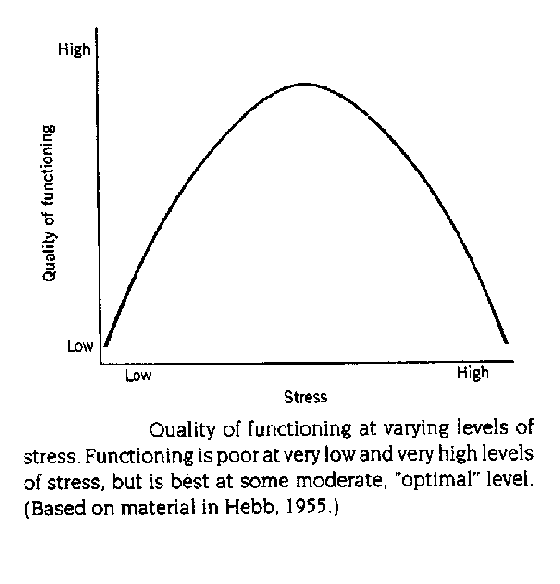
Figure 4: Stress and Motivation (Source: Sarafino 2002 p.94)
A worker who is bored by a lack of challenge may find this situation stressful. (Cooper & Makin 1984 p.28-29) Self-awareness can lead to motivation:
"The more confident people are that they can succeed in the task, the more persistent they will be in trying to achieve it." (Hollyforde & Whiddett 2002 p. 89)
Setting unreachable or unfair tasks will lead to dissatisfaction and poor performance, as too much stress leads to feel unable to deal with the environmental demands, and gives the feeling of tension and discomfort.
top -
next

6.2.5.4 Stress Generator Work
Stress mainly occurs in relationship between the person and the environment. Therefore, one of these stress factors is poor interpersonal relationship, ex. when the boss is
"(…) socially abrasive, being insensitive to the needs of others or condescending and overly critical of the work other individuals do." (Sarafino 2002 p. 86) (28.)
top -
next

6.2.5.5 Health Impact of Stress
In health aspects 'Eu-Stress' impacts are minor and brief and have little impact on a person. But for many people 'stress' is intense and continues for long periods of time. This stress is dangerous. Excessive workloads are associated with health problems, such as asthma, migraine headache, coronary heart diseases, or cancer. (Sarafino 2002 pp.70 - 143)
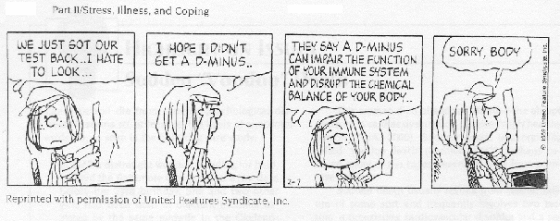
Figure 5: Peanuts Stress (Source: Sarafino 2002 p.122)
Extreme 'stress' might lead to a direct death. (Appendix 6: Stress)
top -
next

6.2.5.6 Disability linked to Stress-Awareness
We are not able anymore to live our creativity and freedom. We have not the flexibility to alter our life, as we are depending on various factors. But our work should affect our capability to arrange and act in our own way. We don't have authority to do, what we want to. Our daily life is to function perfectly. (29.) We have to adjust ourselves to fulfil this external requirement. Stress occurs when we cross our limits and our well-being suffers.
Disabled people disrupt these external expectations. They are outsiders and we can learn from them. Not God had scheduled our time in hours and working days, but man. (30.) (Heidegger, Being and time) Disabled show us to realize and accept limits. Self-sensibility when employing disabled people forces us to deal with the uncomfortable: ex. personal limits, fears, hope, or capability. This process is natural and might be reached more directly and more accelerated when interacting with disabled people. The way of suffering becomes visible and we can reflect empathy. (31.)
Besides 'hard-facts' also 'soft-facts' should be valued. (Rütter & Kokigei 1999 p.166 Translation 1)
top -
next

6.2.5.7 Stress Conclusion
Through the meeting with disabled person we can realize what really is important. Essential questions come up and we have to cope with them. So we grow. We re-think through potential sufferings. We can soften our forms in behaviour and can neglect to be hard. The step towards softening gives us the potential to be good to ourselves. We learn about our own limits and weakness, as we have to accept those of others. Well-fare products and services are booming. I conclude that also the employer as a product will increase demand through well-fare at the workplace and reach 'employee loyalty'.
top -
next
|
|

6.2.6 Conclusion to Motivation
6.2.6.1 How to stimulate peoples' Teamwork?
Staffs expect attention to be given as an individual and not be seen as an interchangeable homogeneous good. The manager has to care about the people who work for him/her, and is at pains to take their situation into account. This itself is motivational. Motivation is basically the job of creating a balance, one that minimizes those things that might create negative feelings and maximizes those that create positive ones. Motivation demands honesty and sincerity. (Forsyth 2000 p.12)
"It is very difficult to motivate if, in truth, you do not really care about people. Staff doesn't want to work for someone who only manifestly cares. They want not just be cared for because they are needed, but really becoming cared about them, for themselves. Communication is important all the way through, especially to tell them when they succeed." (Forsyth 2000 p.12-13)
top -
next

6.2.6.2 Disabled people encourage Teamwork
The attitude to care for employees can be developed in the interpersonal action with disabled people, as they differ from non-disabled people and give a broader perspective and sensibility.
Helping and getting help reminds us on existential encounter. So we need to open our heart. This means we have to remember former experiences of our own helplessness, such as in our childhood or the needs of our parents or grandparents.
We all have subjective experiences in helping and getting help. Both are not always easy. Often, we cannot admit to ourselves that we might need help, and everything around us is too much. How often do we not want to help, because we think it keeps us away from our own task and we are scared not get back as much as we had 'invested?'
Motivation contains a lot of psychology and varies from person to person. There are some people, who find higher motivation with material stimulus (Cooper & Makin 1984 p.31), for others it is important that there is an internal satisfaction and are not dramatically affected by external symbols such as money. (32.) Yet "creating and maintaining a good motivational climate takes some time and is a continuous task." (Forsyth 2000) The employment of disabled can lead to more awareness and remind of the manger's task to care about the employees needs. Disabled are sensible and the individual must be emphasized so that he/she does not feel as interchangeable component. The challenge to handle disabled leads to a higher interpersonal competence.
top -
next
32. Footnote:
Witness the many jobs that offer poor return but are viewed as being vocations because they allow a more personal level of satisfaction. Back to Context
|
|
|

6.3.1 Introduction to EQ and SQ
In the following, EQ is explained which develops interpersonal skills that might be useful in all disciplines of modern life. Later the SQ is explained, and assumed that this gives a drive to stand up in the morning and gives our work a meaning. Both refer to the business society and are linked with the benefit of working with disabled persons.
top -
 next
next

6.3.1.1 A summarizing History of Intelligence Science
In the beginning of the 20th century Freud, himself the first psychologist, developed the idea to measure and compare different humans and their intelligence. His idea became popular under the term IQ (Gaarder 1991). 'The intellectual and rational intelligence (IQ), is what we use to solve logical or strategic problems.' (Zohar & Mashall 2000 p.3) Furthermore, Freud divided a moral and ethnical intelligence (superego) and a drive (id). These two are connected and interact from the 'Ego.' (34.) The highly regarded psychologist Gardner presented with his book 'Frames of Mind' in 1983 the idea that there are seven different intelligence. (35.) These are never developed equally. (Gardner 1994) Gardner called two of these intelligences 'interpersonal' and 'intrapersonal.'
top -
next


6.3.1.2 Two Modern Approaches of Intelligence
In the mid90s' Goleman published his book 'Emotional Intelligence - Why it can matter more than IQ.' (Goleman 1995) It was discussed under scientists, became very popular, and over the years seriously respected. Further psychologist wrote about his idea and developed it especially for work environment. In 2000 Zohar published her book 'Spiritual Intelligence - The ultimate intelligence.' (Zohar 2000) (36.)
top -
next


6.3.1.3 My Personal Approach
Employing a disabled person means to cross boarders and to let something develop that is increasing the well-fare of the organization. On the long run something will develop, which is not easy to put into words.
"(Words) do not express thoughts very well. They always become a little different immediately they are expressed, a little distorted, a little foolish. And jet it also please me and seems right that what is of value and wisdom to one man seems nonsense to another." (Hesse 1954 p.114) (37.)
However, dealing with disabled people gave me a different spirit and different perspectives. Can this idea become developed in our modern society with the possibility to encourage the main business purpose: Profitability?
The society is in an altering situation. In history, the purpose was to work for a living, to work to earn money, ex. to save for a car. Today we do not work anymore to cover our needs. Money is not anymore the motivation for us to pursue our activity. We are safe to get what we need for a living, not at least by state benefits in the case of redundancy. We can just buy things and everything becomes very easy. The question is, if we are satisfied with all this heavy consumption. Today new demands increase in our society, which show that we are searching for a different value. I think ex. about on the growing interest on alternative medicine such as from China, Asian religion or the growing interest on philosophy. (38) We demand more and more wisdom and composition. The idea, which belongs to self-development, is what this work emphasizes.
top -
next
|
|

6.3.2 EQ
6.3.2.1 Introduction EQ
Trough leadership and attention on soft-facts a company can improve its performance by 20-30%. Emotional intelligence is a fundamental part of leadership. EQ can be trained. (Mr. Macintosh; Guest lecturer in 'Management Development' 12/04/2005) To have disabled people as a part of a team can break the barrier to help each other. Helping each other becomes normal and the team members should not only think about their own individual success.
In modern psychology EQ is recognized with equal importance to IQ. EQ gives us our awareness of our own and others people feelings. (Zohar & Marshall 2000 p.3)
"Emotional Intelligence is the ability to sense, understand, and effectively apply power and acumen of emotions as a source of human energy, information, connection, and influence." (Cooper & Sawaf 2000)
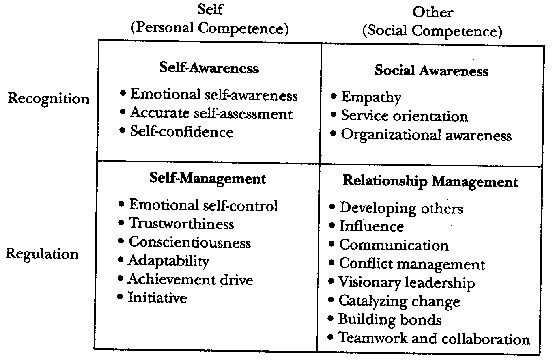
Figure 6: Emotional Competencies (Source: Cooper & Sawaf 2000 p.28)
Academic research found that 'Emotional Intelligence' (EI) leads to a higher performance in jobs. A logical example is that often in business decisions come up, which needs to be made out of a feeling, as data can never be completely accessible.
"The leaders who are most likely to have feelings that point in the right direction, are the ones who have a good sense of why they are reacting as they are. They have learned to discriminate between feelings that are irrelevant and misleading and feelings that are on target." (Cherniss 2001 p.6)
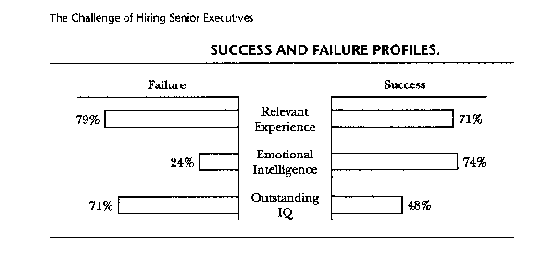
Graph 8: Success and Failure Profile (Source: Cooper & Sawaf 2000 p.191)
Personal competencies can be developed. Generally spoken EI increases with the years. One example of how EI develops is the interaction and experience with other people. (39.)
"Just as individual EI contributes to the EI of the group, group EI contributes to the EI of group members. People who are members of emotionally intelligent groups become more emotionally intelligent individuals.' (Cherniss 2001 p.7)
top -
next

6.3.2.2 Disability and Emotional Competence Development
There are challenges on which the EI increase. One of these challenges might be to work with disabled people. The people at the environment have to look after each other and must be concerned about others people's needs.
The differences in a group membership make work more difficult. But is a challenge:
"We argue that when a relational process such as this (cultural collision) occurs regularly in a relationship the relationship has a greater potential for promoting emotional competence.' (Kram & Cherniss 2001 p.257)
Problems, personal experiences, and individual behaviour should be discussed to overcome barriers and increase performance. The needs of disabled people for help are linked with the communication about problems, so that the staff is used to conversation about problems that might emerge. That fits even when the problem might not be solved: when boarders are clear, then something can be expected from the other person and count on it. The person becomes less scarred, how somebody reacts, as the self-awareness gets better developed. Skills, such as listening or giving feedback become developed and mean a new social awareness. Increasing employee's interpersonal skills might affect costumer service, customer-loyalty, transparency, and confidence in general. That means somehow the entire organization and environment is effected. Yet even more important is that with feedbacks and self-awareness the motivation increases to be seen in a positive light, as I think.
If there is an integration process, reflection has to take place and automatically the EI becomes trained.
"The organizations' culture should values developmental activity and supports individuals to take time to engage in it. A baseline emotional intelligence is for this purpose necessary.' (Kram & Cherniss 2001 p. 264)
There are barriers that need to be overcome. But that also means an option to develop each individual in 'Emotional Competences'.
top -
next
|
|

6.3.3 SQ
6.3.3.1 Introduction SQ
To keep well-fare, economical growth is necessary.
"The question of growth is nothing new but a new disguise for an age-old issue, one which has always intrigued and preoccupied economics: the present versus the future." (James Tobin, quoted by Mankiw 2000 p.77)
Also humans need to grow. This need for growing is endlessly, as there is no point when satisfaction is eternally reached. We have all we need. Two TVs per person in each household are not likely to increase the level of satisfaction. So, there should be a change in perspective, away from the quantitative to the qualitative growth.
SQ facilitates a dialogue between reason and emotion, between mind and body. "It provides the self with an active, unifying, meaning-giving centre." (Zohar & Marshall 2000 p. 3)
When confronting non-disabled with disabled the non-disabled becomes aware of the human imperfectness, as the counterpart has at least one visible imperfectness. This reminds on sickness, which increases our awareness of ourselves. We reach a new perspective from suffering, and health gets a higher value. The awareness of this well-being might also be potential growth for the organization, as the quality of the employees' skills increases.
top -
next

6.3.3.2 Brain Work
In the following I try to summarize the Newtonian Science (40.) of the physical core part of the brain. This should give an understanding of what is going on inside of our brain. In short: the Thalamus develops SQ.
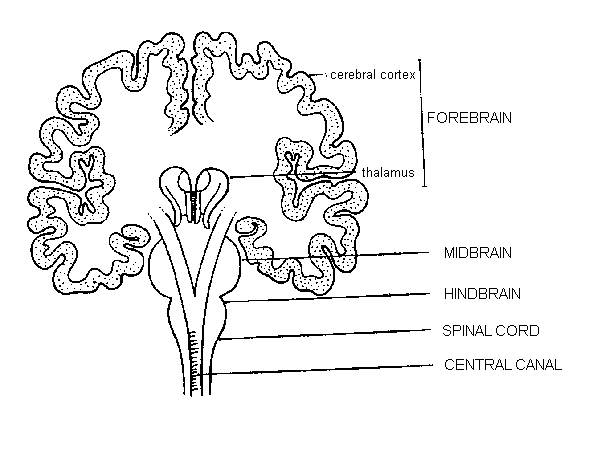
Figure 7: Brain Work - The Thalamus (Source: Zohar & Marshall 2000)
The history of the brain can be compared to some extend with an historic town. There are fundamental grounds, on which the evolution built its' development. The base of the human brain is the central nervous system. Mammals developed a forebrain, which is mainly controlled by instincts and emotions. This includes the cerebral hemispheres that let humans think rational. (41.) (Zohar & Marshall 2000 p.43)
In latest brain science it is said that we think with electrical waves, which 'swing' through our brain and nerve system. The dead centre, or delay of this network is the Thalamus. Furthermore, it has the function to filter. (Zohar & Marshall 2000 pp.74-76) Therefore, it is the object that gives us the function of discrimination. (Zohar & Marshall 2000 p.5) However, its relay job is only ca. 25% of its potential complete activity. Put frankly, the Thalamus is also activating 'swings' through our brain and gives us our conscious mind.
"The 40 Hz across-the-brain oscillations provide a means by which our experience can be bound together and place in a frame of wider meaning (SQ)." (Zohar & Marshall 2000 pp.74-76)
SQ makes us different from animals and computer is that we are aware of our experience, and aware that we are aware. (Zohar & Marshall 2000 p.59) So computers can only work in boundaries. Yet humans can play with boundaries an 'infinite game.'
"We understand common or given situations and behaviour pattern and rules with our first two kinds of thinking, but we create new ones with this third kind." (Zohar & Marshall 2000 p.59)
top -
next

6.3.3.3 The Search for Meaning / The Lack of Spirit
So there is still the question of what drives people. People are depending on this world. All they have is hope for a better life. (42.) If they don't have hope, the world is worth nothing. This is very common in our modern society. We life in great well-fare and it is questionable what can be changed to make it even better. Changes, which can make our life more worthy become marginal and satisfactory is short. (43.) This might be a reason why in our well-fare society one of the most common deaths under teenagers is suicide.
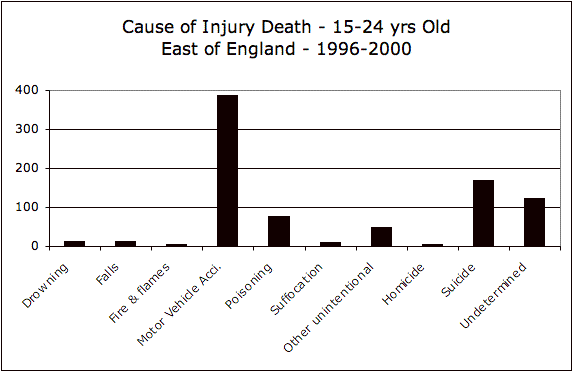
Graph 9: Cause of Injury Death (Source: NHS 2003)
In addition to this, there are many people who make abuse of substances, such as alcohol. This abuse is a sign, that many people repress a lot of their problems and worries.
Workaholics too repress problems. What are the differences between a workaholic and someone how likes to work? Workaholics fight against themselves and against the power of their emotions, a battle they want or need to win. It is some form of repressing and the desire for death. Someone who just likes his work is doing this for self-development, self-purpose to satisfy needs. (Killinger 1992)
Meaning of life is, as I explained earlier with the example of Socrates, a primary drive in human lives. Many of our thoughts are lacking the spiritual creatures, which are part of us. If the human does not meet a deeper meaning through live, the person feels empty and useless. "For a great many of us today this need is not met, and the fundamental crisis of our times is a spiritual one." (Zohar & Marshall 2000 p.19)
top -
next

6.3.3.4 The Disability Spirit
Disabled give as the potential to escape from those negative feelings, as nobody really fits in social role and they cannot take masks on to make this lack invisible. The confrontation with disabled persons will lead us into a category of emotions that have been repressed and evoked again: we encounter our own feelings, which lead us to self-awareness and self-confidence. If we trust ourselves, than we can trust somebody else too. Time has changed and it is not anymore easy to fool customers. Customer loyalty becomes more and more important. The customers' demand for confidence increases.
One reason why we suffer in our western civilisation is our Newtonian approach to everything. Our every day life must be measured objectively. (Zohar & Marshall 2000 p.11) This intercultural collision should challenge us to overcome repressions. The repression occurs in the obsession with health by which meaning-deprived people seek wholeness. We see the body as a mechanism, a
"(…) well oiled gene machine; disease as something to be eradicated or 'cured'; ageing and death as 'faults' or 'enemies' of the system." (Zohar & Marshall 2000 p.29)
That means if someone is confronted with the 'not being perfect' of the counterpart, than he has to think about himself and confront the threats that come up during lifetime.
top -
next

6.3.3.5 Conclusion SQ
In personal life I'm really concerned about the impact that the humans have on our nature. It is a rational conclusion, that you and I, destroy ourselves, sooner or later. Hypothetical questions like 'What will the life look like, when in 10-15 years all oil reservation is empty or not in efficient reach?' have to be repressed.
"He continued that he was very worried about the state of the world, especially of the global environment and the breakdown of community. (…) Big businesses like his, he felt, were especially guilty of not facing such problems. 'I want to do something about it,' he continued, 'want, if you like, to use my life to serve, but I don't know how. I just know that I want to be part of the solution. Not the problem.'" (Zohar & Marshall 2000 p.20)
For me, the integration of disabled people in work society gives me the hope, not to be one of the 'badies,' but to encourage humanity, and be therefore, motivated by my own needs, more 'efficient' and one of the 'goodies.' Egoistically, humans want to be something and to contribute something to the world. It is not reasonable to work for hours and days but with no meaning. We are orientated on values. Growing in quality within a job means that this job gives something: A win/win solution.
top -
next
40. Footnote:
This term refers to the physicist Newton. Put simple, he mainly found rules to which everything works. He measured therefore things such as masses, lengths and time. His findings had massive impact on our civilization, especially the industrialization. I like the term 'Newtonian Science' in this context, as modern scientists refer to Einstein. He developed the idea that everything is relative to its surroundings and proofed it mathematical. ('When neglecting the changes of mass, length and clock rate on Mercury with respect to outer space, we find an erroneous prediction because we use outer space physical parameters instead of proper parameters.' (Marmet 1997)) Back to Context
|
41. Footnote:
'Tranquillizer' such as great stress, drunkenness or violent emotions can partly switch off the cerebral hemisphere and lead us to behaviour that is found in lower animals. Back to Context
|
42. Footnote:
To give an impression of the meaning of hope for motivation a summery in this context of Orwell's 'Animal Farm.' (Appendix 8: Animal Farm) Back to Context
|
43. Footnote:
Open refrigerator; eat. Back to Context
|
|
|

6.3.4 Conclusion SQ & EQ
This work is the approach to show the social development, which leads away from the competition thinking to an intrinsic motivation. This will give hope for an ethnical development that does not exclude economical profitability.
top -
Chapter 7
|
|


